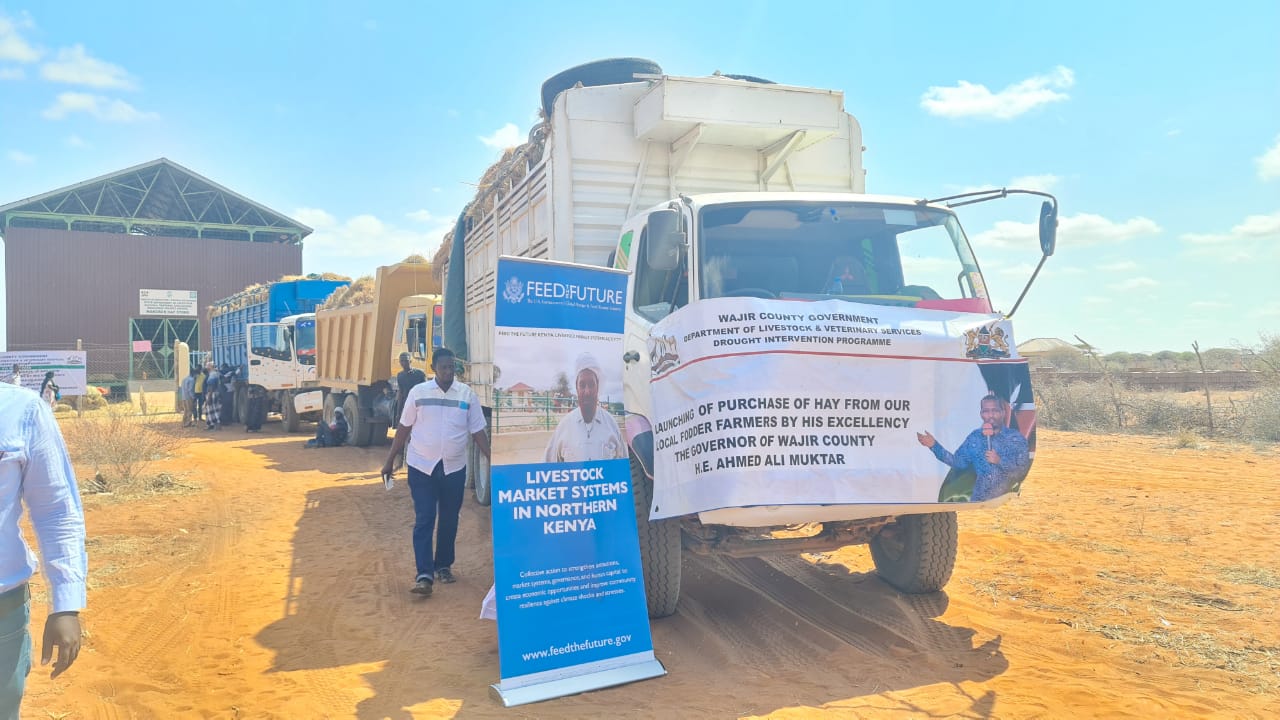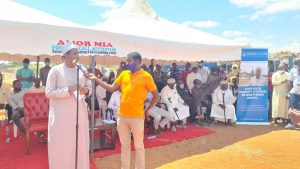
In 2021, drought hit many parts of Northern Kenya, with the greatest impact experienced in Garissa, Mandera, Marsabit, Isiolo, and Wajir counties, according to the National Drought Management Authority (NDMA). The drought continued into 2022, destroying pastures and grazelands and threatening the livelihoods of the pastoralist communities. According to the NDMA, livestock mortality stood at 1,437,632 in 15 affected counties by December 2021.
In Wajir County, Dokono Ventures, one of the small- and medium-sized enterprises supported by USAID under the Feed the Future Kenya Livestock Market Systems Activity, continued to be a source of community hope. The farm and enterprise were set up in 2018 as a family-run business. It is located in Bute town in Wajir North Sub-County and borders Ethiopia to the south. The business owns 32 acres of farmland with 10 acres under rain-fed fodder, selling for 500 Kenyan shillings per bale. The farm was established to provide adequate, nutritious, accessible, and affordable livestock feeds to pastoralists in the North Eastern Province. However, without proper infrastructure and equipment, they were only producing and storing a low number of approximately 800 bales a year.
In 2020, the business successfully pitched a Business Model Canvas to the Activity, which is led by ACDI/VOCA, and secured $13,000 in capital injections to purchase a modern hay barn and related structures. The support allowed the investor to make huge strides. Dokono Ventures now produces up to 5,000 bales of hay per year, representing 500 percent output growth.
Hay storage was an asset during the heart of the drought season in 2021. In October, the county government of Wajir purchased 1,401 bales of fodder from the enterprise at $4.00 per bale. This was part of the county government’s commitment to purchasing 10,000 bales of fodder from local farmers to support communities during drought. The hay was distributed to 700 livestock farmers living in urban and peri-urban areas; each farmer received two bales, or 24 kilograms, of hay.
“Thanks to the linkage facilitated between us and the county government of Wajir by [the Activity], we managed to sell 1,400 bales of hay to the county government. This was distributed to 700 households in the county and has improved community resilience to the drought across the county. I look forward to selling more fodder to the county and other clients.”
Mohamed Sheikh, director of Dokono Ventures

Wajir County Governor Ali Ahmed Muktar made a speech during the flagging-off event. Dokono Ventures contributed 1,400 bales of hay for distribution to the community. Photo Credit: Suleiman Saney, ACDI/VOCA
Wajir County Governor Ali Ahmed Muktar presided over the flagging-off event. During his speech, he urged partners to work closely with the county government to actively promote fodder production, conservation efforts, and community resilience in the face of recurrent drought, by prioritizing the purchase of hay from local farmers. The county government also committed to purchasing hay from local farmers as part of its interventions to mitigate drought and improve the incomes and livelihoods of households.
Dokono Ventures has plans to extend its farmland to produce more fodder and satisfy an increasing demand in Northern Kenya. Mohamed said the business has received queries from clients coming from as far as Mandera, about 345 kilometers away, to seek hay. According to Mohamed, “The business made great sales over the last three months, and there is currently no inventory in stock.”
Learn more about our work in Kenya.
Learn more about the Feed the Future Kenya Livestock Market Systems Activity.








